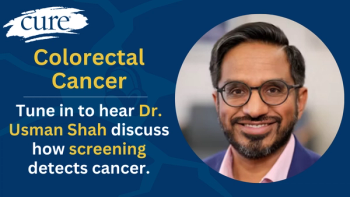
How can colonoscopy detect colorectal cancer early and prevent it by removing polyps, compared with other noninvasive screening methods?

How can colonoscopy detect colorectal cancer early and prevent it by removing polyps, compared with other noninvasive screening methods?

CURE spoke with the author of “Between Two Kingdoms” and “The Book of Alchemy” about the latest chapter in her cancer journey.

Advances in leukemia treatment now include targeted drugs, lighter chemotherapy and combination regimens that improve tolerance and reduce resistance.

Patients can best advocate for themselves by asking questions and remembering they have the right to be active participants in their care.

Dr. Paul Gellhaus says PSA testing and modern biopsy methods ease fears and reassure patients, making early prostate cancer detection safe and valuable.

Elahere, validated in a phase 3 trial, is FDA-approved and offers the first major advancement for platinum-resistant ovarian cancer in decades.

In an interview, Dr. David A. Taub highlighted Prostate Cancer Awareness Month by outlining current treatment options for patients with prostate cancer.

CURE sat down with Dr. Tanja A. Gruber of Stanford Medicine Children’s Health to discuss clinical trials in infant leukemia.

Stage 1 melanoma is treatable with surgery, and when combined with early detection, proper care and regular follow-ups, it offers a favorable outlook.

Patients with breast cancer receiving antibody-drug conjugates after chemo can generally expect milder side effects compared with their previous treatment.

Genetic testing before chemotherapy may help improve safety and guide treatment for patients with gastrointestinal cancers.

For many women facing cancer, having a female oncologist can bring an added sense of support and understanding, according to Dr. Tran Ho.

FDA-authorized AI tools have the potential to help patients with prostate cancer get clearer answers instead of waiting weeks for genomic test results.

Dr. William Audeh explains how treatment decisions for breast cancer can be informed by a patient’s ultra-low, low or high genomic risk status.

Kristen Dahlgren of the Cancer Vaccine Coalition spoke with CURE about patients’ need to find reliable sources of information.

An off-the-shelf cancer vaccine is associated with durable responses and a reduced risk of relapse and death among patients with pancreatic or colorectal cancers.

Kristen Dahlgren of the Cancer Vaccine Coalition spoke with CURE about why she remains hopeful for the future or cancer vaccines.

The GIST treatment landscape has shifted in recent years due to the emergence of new therapies, many of which patients should be aware of.

When a family member receives a diagnosis, it can present emotional challenges for children.

CAR-T cell therapies are now being explored for the treatment of solid tumors like gliomas, Dr. Tanja A. Gruber explained in an interview with CURE.

Personalized vaccines are currently being investigated for the treatment of patients with kidney cancer; however, the investigation is still in early stages.

Although GIST can be identified during an endoscopy, according to Dr. Rosario Ligresti, these are still rare tumors that warrant further characterization.

For patients undergoing a radical cystectomy, staying active before and after surgery is key, Dr. Janet Kukreja explained.

Natural killer cells, also referred to as NK cells, play several major roles in the body's defense against cancers like renal cell carcinoma.

It is important to expand clinical trial access for patients with kidney cancer in order to ensure a representative study population.

The accelerated approval of Modeyso for diffuse midline glioma with an H3 K27M mutation, is a step in the right direction but more work remains.

Dr. Jim Omel, who was diagnosed with multiple myeloma in 1997, explained how the treatment landscape has changed over nearly 30 years.

There are many reliable resources available to patients with kidney cancer, as well as their families and caregivers.

Follicular lymphoma survivor Troy Anderson credited acupuncture and nutrition guidance with easing treatment side effects and aided in remission.

Dr. Aaron Gerds explained when treatment with rusfertide will become accessible for patients with a myeloproliferative neoplasm like polycythemia vera.